Nautical idioms and sailing terms
This 5 part article is all about sailing terms that found new meaning (idioms). We have adopted numerous sailing terms in our modern-day language as idioms. Here is a list of these sayings and expressions that are of nautical origin. The below collection lists the meaning of nautical terms both literally as well as figuratively and describes the etymology behind them…
“At this point, I have to disclose that the accuracy of the information below may have been construed with some poetic license, based on the information from others and some assumptions that are not verifiable. You have an opportunity to tell me so at the end of the list…”
Click on the idiom in the table of contents for more details or just scroll through the list…
1. Feeling blue
Feeling blue is an idiom we use a lot when we are feeling down or depressed but where did it come from? There are some schools of thought that argue that the term “feeling blue” came from a maritime custom of raising a blue flag after the ship’s captain died. On return to the home port, the blue flag was raised notifying the authorities in advance about the demise of the captain. A negative connotation is associated with the fact that the crew either were feeling generally sad about the loss of their leader or perhaps more a feeling of apprehension as they had a bit of explaining to do as to the death of their master to avoid any accusations of mutiny.
If you are feeling blue then why not contact Beyond Blue…
2. Down in the doldrums
Being stuck at sea without the prospect of wind is an unenviable situation particularly when the wind was the only mode of propulsion. The Doldrums is an actual area of low pressure which you find just north of the equator. It is known for extremely light winds or no wind and spans several hundred miles. The area is known as the Inter-Tropical Convergence Zone or simply “itch“.
Today we use the idiom to express that we are not in a good (mental) space…
If you feel that you are down in the doldrums then you can contact the Black Dog Institute…
3. Pipe down
Shut up! Pipe down… It is time for a bit of quiet! You heard the expression enough times but where did it come from? Well, the Bosun’s whistle is referred to as a pipe because when you blow on it you “pipe” a command rather than whistle one. It is a rudimentary high-pitched instrument that was used to communicate orders and commands over the noise of the sea or battle. It was also used to order the crew to “pipe down” and move into their nightly routine. Shortly thereafter most sailors would bunk down and go to sleep. Hence the connection between the old pipe down command and the modern “be quiet” idiom.
Today, the Bosun’s pipe is still used to welcome high ranking officers or honoured guest onboard a ship.
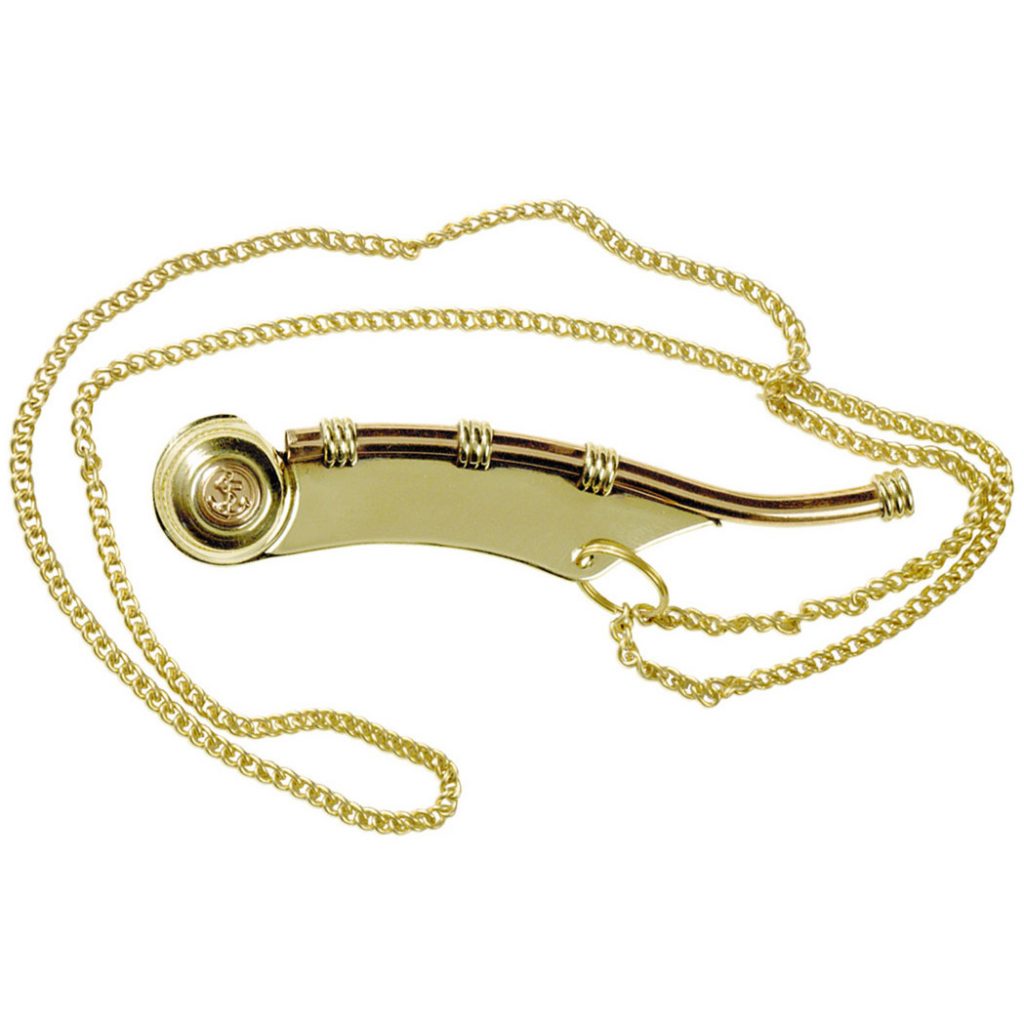
4. By and large
Today we use “by and large” to mean on the whole; everything considered. However, the expression has a nautical origin. It used to refer to a sailing vessel’s ability to sail well close to the wind (by) as well as the ability to sail well with the wind behind you (large).
5. Aloof
If you are aloof you are acting in a way that can be seen as unfriendly or not very forthcoming. But did you know that its origin can be found in sailing? In essence, keeping or staying aloof referred to steering the sailing vessel away from a lee shore or obstacle usually as much into the wind as the ship was capable of. The “moving away” is now interpreted as keeping your distance in both a physical and emotional sense.
6. Dutch Courage
The Anglo-Dutch wars between England (now Great Britain) and the Dutch Republic (now Holland) was predominantly fought at sea. The expression “Dutch courage” arguably came from the English soldiers that noticed that there was a direct correlation between the consumption of Jenever (a Dutch gin) and the courage displayed by the consumers of the beverage. Today, however, we use the expression “Dutch courage” where a drunk is displaying a level of bravery that is clearly fully contributable to his inebriation.
7. As the crow flies
As the crow flies denotes the shortest route between two points. Ie, a straight line on the map. In the days before sophisticated navigational aids, Vikings use to deploy crows as a last resort to find land. It is said that the crows would fly instinctively directly to the nearest land. Naturally, if the crow came back no land was in reach. A simple calculation of flight time and speed would tell the sailors that land was at least that distance or more away on that specific bearing. However, if the crow didn’t return it was assumed it found land and the sailors would set a course on the same bearing as the crow took.
8. Son of a gun
So you thought a son of a gun was just a tough fellow. Perhaps its origin somewhere in the mid-west in them gun slinging days. Perhaps, but originally, it is a nautical term for a child of uncertain parenting. When women where onboard ships they were often there for extended periods of time due to the long voyages and slow pace of the square-riggers. Naturally, some of these women gave birth during their voyage. This was often facilitated between two of the guns as it offered some limited privacy. If none of the sailors owned up to being the father, the captain would enter the birth into the ship’s log and denote that the child was a “son of a gun”. Ie, father unknown…
9. Loose cannon
So this guy I know is a bit of a loose cannon… In another words, he is unpredictable or hard to control. Yes, another maritime expression. Cannons on the old ships were heavy and in rough seas could do unspeakable damage to ship and crew if not secured properly. At least 1,000 kilos each, it was common practice not to have loose cannons on the gun deck…
10. To the bitter end
Let’s follow this through to the bitter end at which point we realise that the “bitter end” is the end of a rode (for example an anchor chain) located at the opposite side of the anchor. The bitter end is usually attached to the “bitt” which is a strong point on a boat such as a cleat…
11. Give it a wide berth
No surprise there. Sailors needed to anchor in harbours all the time and were provided with a berth; space where they were allowed to anchor. Other boats never really knew how long their anchor rode was so to be safe, these sailors gave the anchored boat a wide berth so not to cause problems.
12. Through thick and thin
13. Hand over fist
To do something quickly is to do it “hand over fist”. It finds its origin in sailors having to adjust sails very quickly to respond to adverse wind changes. This was often done by several men pulling on the same sheet and literally putting their hand over their fist repeatedly until the sheet was adjusted correctly…
14. Keeled over
He was okay but then suddenly keeled over and died… The connection is pretty clear. When a boat’s keel is sticking out of the water it is upside down and something it severely wrong.
15. Tapping the Admiral
Okay, this one is a bit obscure and to be honest, rather disturbing. So in modern-day language, if you are “tapping the Admiral” you are stealing booze often by using a straw or any such acts that falls within a broader scope.
Now, remember Lord Nelson and his glorious demise at the battle of Trafalgar in 1805 where his fleet defeated the Frenchies and Spainyards off the coast of Spain? So he died during the battle and the rest of the fleet wanted to bring their hero back to England but they were a long way from home and corpses do not last very long in the sun so a solution needed to be found. “I have an idea, let’s double him over and stuff him in one of the barrels of brandy so the alcohol will preserve him and all will be okay.” “Smithy, that is a great idea: make it happen.” Up to now, the story is a bit bizarre but it was 1805 after all so what the heck, let’s just accept it…
But then the story becomes a bit creepy because when they arrived in Gibraltar to take a still fine-looking Horatio out of the barrel, they discovered that the brandy was gone. Looking around for answers to solve this mystical disappearance of alcohol, they found most of the crew looking relatively happy with themself with rather glazed over eyes. Okay, they were drunk. So to cut a long story short, the brandy was in all likelihood sucked out of the barrel during the trip by the crew and that is simply too disgusting to ever forget!
16. Bottoms up
Bottoms up! A cheerful gesture in today’s language encouraging your mate to finish his drink already so you can order another one…
However, the origin of “bottoms up” is much more sinister. It is called shanghaiing or crimping and was a common practice to combat an enormous labour shortage in the navies around the world. In essence, you would be tricked (at best as some were just kidnapped) into contracting with the Navy for your services. It was most likely called “shanghaiing” because at the time a lot of ships simply sailed to Shanghai. The unscrupulous individuals engaged in shanghaiing were called crimps hence crimping is synonymous with shanghaiing. So with this background out of the way, where did “bottoms up” originate from? Well in torts (judge-made law), contracts require some basic elements for a contract to be legal. Consideration is one of these elements. Ie, some payment for services rendered. So here is what the Crimp got up to…
“So Smithy, (yes, by an extreme coincidence it was the same Smithy as above), you look like you can use a beer. Have one on me…” “Gee, thanks glug, glug, glug, glug ahaaaa… Hey, what is this penny doing in the bottom of my glass?” “Well Smithy, that my man, is the payment you just accepted to serve in Her Majesty’s Navy. All legal: done and dusted. We sail tomorrow at high tide and these 6 large rough-looking gentlemen will escort you right now to your new home for the next 6 years.” “Whaaaaaat!”
After some time, the unsuspecting citizens of coastal towns and villages caught on to this legal but despicable practice and became a bit more cautious. “So gents, you all look like you can use a beer.” “Sure mate, and end up like my brother Smithy! Before we accept your beer, we would like to see if there isn’t something hidden at the bottom of the glasses. So hold those bottoms up so we can check.”
Okay, we got there in the end…
17. Showing her true colours
“So captain, that looks like a commercial vessel flying the French flag so I guess it is time for some killing and plundering?” “You bet Smithy… We hate the French as much as the Spanish so let’s go…”. However, within reach of her guns, the “commercial vessel” opened her gun ports and raised her true colours: the Spanish Naval flag. Smithy had seen better days….
This practice was ripe with pirates as well. Whilst pretending to be commercial vessels loaded with goodies from the continents, they raise the Jolly Roger at the last moment to overwhelm the privateers or small naval ships.
As an aside note, a ship “wears” the flag whereas the owner of the ship “flies” the flag. Also, rather than saying “raising the colours” one says the colours are “made”.
See also “Bamboozle“.
18. He turned the corner
We turn the corner after we go from something bad to something better. The first usage of the phrase was arguably spoken by sailors on their way home from India whilst going around the Cape of Good Hope at the most southern part of Africa.
19. Everything is hunky-dory
Everything is going well and without frustration. That may well ring true for the US sailor visiting Japan. There are 2 theories here…
- The Japanese honcho dori freely translate into “main street”. When sailors enjoyed their R&R in the little back streets of Japanese ports, it was important for them to find their way back to their ship before the ship sets sail. As most main streets lead to the docks, it is believed that finding honcho dori (the main street) made everything okay as the street would lead them to the ship and hence everything would be honky-dory…
- There is another school of thought that argues among similar lines with the main street (honcho dori) at the centre of the story. However, this second possible origin of the idiom differs from the first by arguing that in many of Japanese ports, the main street accommodates a certain adult entertainment industry popular with the sailors. So getting to honcho dori made everything honky-dory.
20. All hands on deck
When we need to get things done we say “all hands on deck” denoting that everyone needs to assist in the task ahead. This is not so different in nautical terms. The order “all hands” or the longer version “all hands on deck” was given to all crew and officers of all ranks to assemble on the deck for a task, a briefing or any other activity that required all ship’s personnel to be involved.
21. He is dead in the water
When something is neither moving forward nor backwards without any progress it is said to be dead in the water. Similar to down in the doldrums, it denotes stagnation. A ship dead in the water is simply a ship that lost all propulsion and is positioned in the same spot for a prolonged duration.
22. He is sailing close to the wind
Sailing close to the wind refers to taking risks. As in “he sailed pretty close to the wind when he flew his drone further with only 5% battery life left”. In sailing terms, you are sailing close to the wind when you are close-hauled. We are trying to achieve a bearing that is as close into the wind as our boat and physics allow us which is around 30 degrees from having the wind dead on the nose. When we are close-hauled, we run the risk of entering into the “dead zone” and where we said to be “in irons”. The boat loses momentum and eventually stalls and moves backwards.
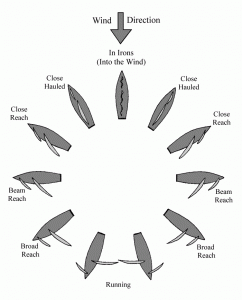
23. A square meal
That was an excellent meal that filled me up to the brim. The origin of the idiom “square meal” dates back to mid-16th century Royal Navy practices where sailors were served their main meal on a square wooden plate.
Although some argue that the etymology is simpler and stems from the word “square” as in “right”. This has a lot of merit as the words square means right in the context of “right angle”, ie, square. This is further supported by the fact that we use sayings like “fair and square” and to “square things away”. However, this is a list of nautical idioms so we need to cling to the former much more romantic explanation. That’s what Smithy would have liked…
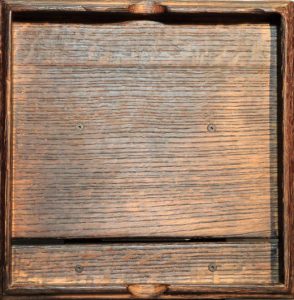
24. Cold enough to freeze the balls off a brass monkey
That seems very cold to me and I guess that is precisely what the idiom is trying to say. It finds its origin (arguably not) in maritime folklore where the iron cannonballs were stacked in a pyramid next to the cannon for ready use when the need arose. We have all seen it at the movies, where 1 cannonball sits on 4, sit on 9 sits on 16 sit on 25 cannonballs. (An interesting mathematical conundrum but that is a different story). This pyramid was constructed on a brass plate which was called the brass monkey. It had the appropriate number of indentations to hold the bottom layer of cannonballs. In freezing conditions, the brass plate contracted at a quicker and at a more pronounced rate compared to the iron cannonballs positioned on the plate. The brass monkey became too small to contain the bottom layer of cannonballs and hence, the cannonballs would roll-off; freezing the balls of a brass monkey…
In any case, a nice well-circulating folk tale. Personally, stacking cannonballs in this manner on a ship on the open sea seems challenging at best but let’s not have facts stand in the way of a great idiom…

25. I don't like the cut of his jib
In the early 16th century, the way the headsail or jib was shaped could give a good indication as to the nationality of a ship. So the conversation may have gone something like this: “What is up Smithy?” “Sir, I do not like the cut of her jib. Although she looks dead in the water and is displaying the English flag I think she is not showing her true colours. Looking at her jib, it seems like a Spanish ship to me…”
By the 17th century, non-maritime folk started using the expression simply to say that they didn’t like a person’s general demeanour.
26. Three sheets to the wind
Last night he was three sheets to the wind so I don’t think he is having any drinks tonight… So if you are three sheets to the wind you are out-of-control drunk.
There are 2 very credible pathways for getting to the origin of the idiom. One finds the origin in sailing and another is windmills. You make up your own mind if we can claim this one…
The windmill theory
The miller referred to his sails on his mill as sheets. The size and the number of sheets he used depended on the wind conditions with one constant. The number of sheets was always an even number (2 or 4) and the sheets were always opposite each other. Deploying the third sheet without an opposite would create severe instability and cause wobbles and vibrations to the point where the mill could collapse. From there, it is easy to see the connection to the use of the idiom in modern-day language…
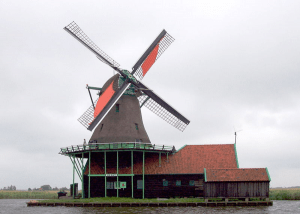
The sailing theory
Sheets in a sailing context refer to ropes that control the sails. When a sheet fails, the sail starts to luff and flap about. One could argue that if you lose control of 3 sheets, the situation would be rather chaotic as the ship would potentially stop dead in the water and starts to respond more viciously to the swell and waves almost emulating the uncontrolled stagger of a drunk person.
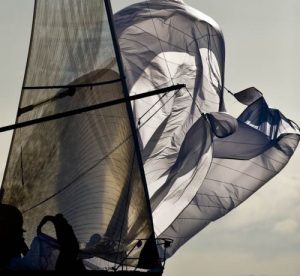
27. Posh people
So we all heard posh used to denote a person with style and money. The origin of the adjective may stem from the anecdotal tale of P.O.S.H. or “Port Out, Starboard Home”.
From the mid 17th to the mid 18th century, the Oriental Steam Navigation Company ferried passengers from England to India. On the way to India, the port side cabins were favoured because of the setting sun and the swell conditions. Returning home, naturally, the starboard cabins we in higher demand because of the same reason. So as a clever marketing ploy, the company offered Port Out, Starboard Home tickets where passengers had the best cabins on both the Indian leg as well as the home leg of their journey. So those passengers with a ticket stamped P.O.S.H. were often the wealthy and trendsetters of their day and were later known to be posh people…
Unfortunately, there is no evidence to date of any documentation that shows P.O.S.H. in printed form within the context just described. If you visit your grandmother next, ask her if she has any old voyage tickets laying about. We need this story to be true…
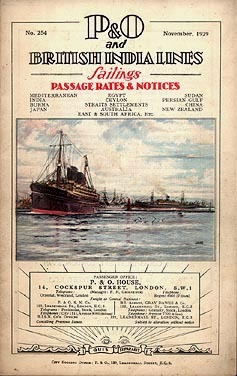
28. Swinging the lead
Perhaps a bit more obscure and less used in modern language but still a good example of an idiom finding its origin in the nautical realms… It is used to denote a lazy person that doesn’t do his job or shirks his responsibility.
In actual fact, swinging the lead is the forerunner of our depth sounder. A tapered cylinder-shaped piece of lead attached to a rope was thrown as far forward of the ship as possible and let sink to the seabed. The lead was then retrieved by pulling up the rope which had knots every 6 feet or 1 fathom. The knots were counted up and told the sailor the depth at that specific location. Often the leads had hollow basis so some of the seabed would come up to the surface lodged in the hollow which provided even more information about the seabed’s makeup. There is only one issue with this explanation which is that there is no evidence that any sailor in those days used the phrase “swinging the lead”.
Related: “sound off“
29. Another day, another dollar...
When we do tedious work, we say “another day, another dollar” letting ourselves know that we at least are getting paid for what we are doing. Originally used by US sailors in the 19th century it had a rather literal meaning as most sailors were actually paid 1 dollar per day. This coupled with the fact that one day at sea could be very much like the next makes this a credible story…
30. Between the Devil and the deep blue sea
You are between a rock and a hard place is one interpretation of the idiom “between the Devil and the deep blue sea”. In that context, the devil is just that, the devil and the deep blue sea doesn’t hold much more promise either. In this interpretation, we say that we have 2 choices and neither of them is good.
But this is a nautical idiom list so here we go with the “real” origin. The “devil” is described as the outer plank on the deck of a ship. It is often thicker than the other deck planks to add strength so it is somewhat more problematic to caulk (waterproof) particularly at the outer edge where sailors needed to be on the outer side of the railing. “Smithy, today you are re-caulking the devil’s outer edge.” “That sounds like a fantastic job Sir. I just love working between the devil and the deep blue sea.” The captain noticed some level of sarcasm but let it go…
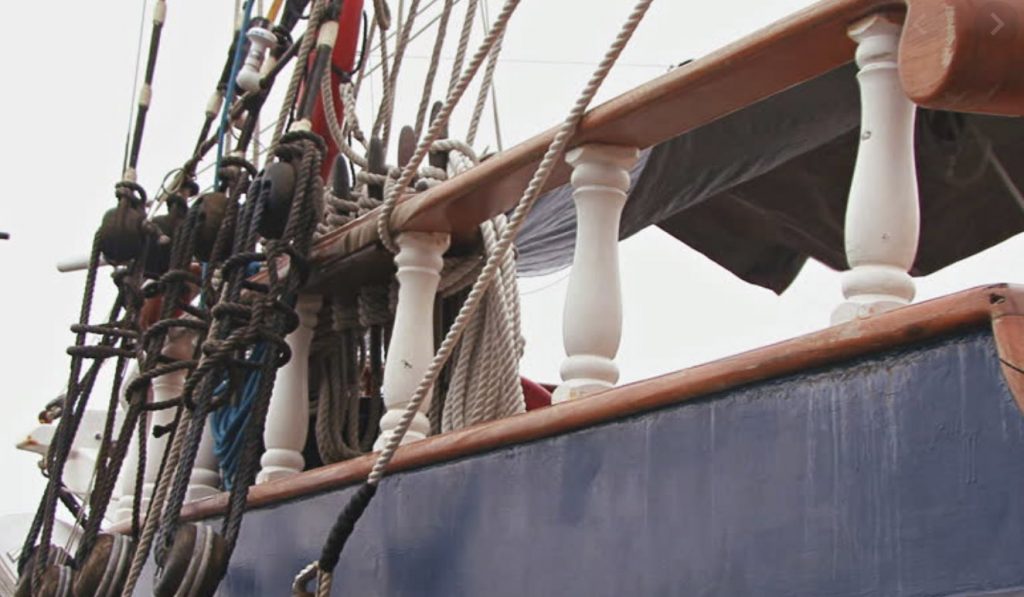
31. Get underway
We begin a journey or a project and say that we are underway. The well documented nautical term “way” means moving as it makes reference to the “way” created by the bow moving through the water. These small bow waves can only by definition be created when the ship moves forward.
The “under” part of underway may stem from the fact that under sail and underway were for some time interchangeable and so were combined.
Further evidence can be found by looking at the Dutch word “onderweg” which means that you have started your journey. Because a large number of Dutch sailing terms entered the English language in the 1700s, it seems a credible explanation of the origin of “getting underway”.
32. Hard and fast
When someone is said to be hard and fast asleep it means that person will not wake up in a hurry.
It is 100% clear that this is a nautical expression as it has been used for centuries. Its literal meaning means simply a beached ship. We know it is an old idiom because folks were already using “hard and fast” figuratively in the early 1800s… “Hard and Fast” is synonymous with “High and Dry”

33. High and dry
See “Hard and Fast”
34. Knowing the ropes
When you know the ropes you possess enough experience and knowledge to get the job done. Seeing the connection to a nautical origin is too easy here; or is it. Sailors need to know rope terminology and practical application of the numerous ropes on a ship. Lines, sheets, cunningham, top lift, halyards the list is endless. So it is a credible and likely origin and is definitely documented. But here come the Italians claiming that knowing the ropes is an expression that has it origin in the theatre. Fair enough, there are tons of ropes behind the scenes but I think we can claim this one without blushing…
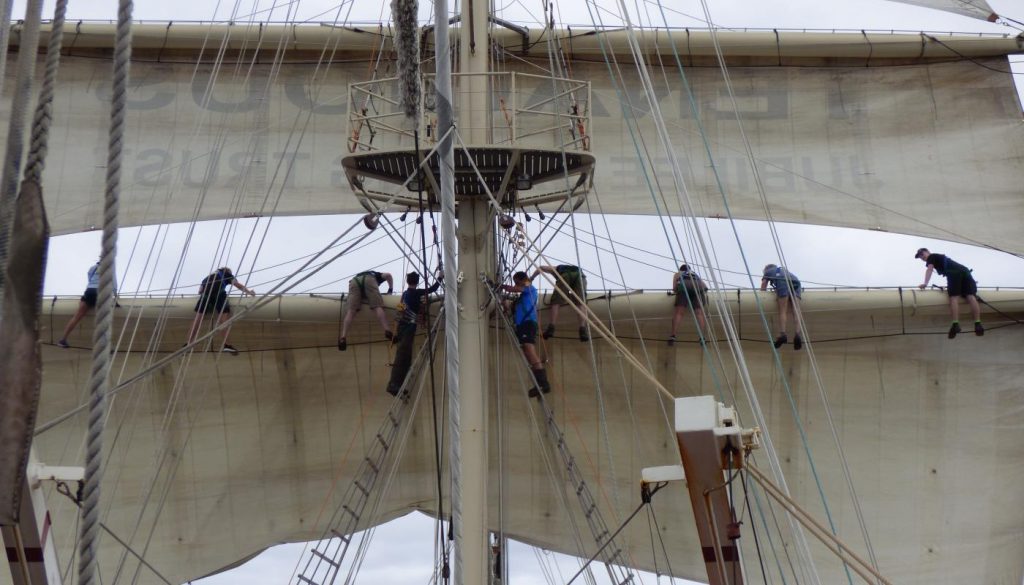
Did you know that there are actually very few ropes on a ship that are called ropes?
- The bell-rope – the small often ornate rope attached to the clapper.
- A common rope on sailing vessels is the bold-rope on the leech of the sail and can be used to “shape” the sail.
- Tow-rope simply for towing.
- A foot-rope uses to stand on whilst taking in sail on the old square-riggers.
- Man-ropes which you often find on either side of rope-ladders used to board ships.
35. Slush fund
Today we associate a slush fund with money set aside for unethical purpose such as bribery. However, the origin is very different and less dishonest but equally dubious. Sailors used to get rations of beef which contained some level of fat. Fat in those days was in high demand and a consumable that was easily sold on the open market. So the sailors may have collectively carefully separated the fat from their meat and stored this to be sold at the next port. The “pot” in which the fat was temporarily stored was called the slush fund.
36. Tell it to the marines
“Tell it to the marines” means “pull the other one” Ie, I do not believe you.
In the mid-1600s, the idea of bringing marines on naval ships took hold. Naturally, there was a great rivalry between the sailors and these marines, both having a different skill set. Sailors argued that the marines were a bit “thick” and hence the expression “tell that to the marines” was born suggesting that the marines were stupid enough to believe it. I’m sure there must be an idiom returning the favour but I could not find it…
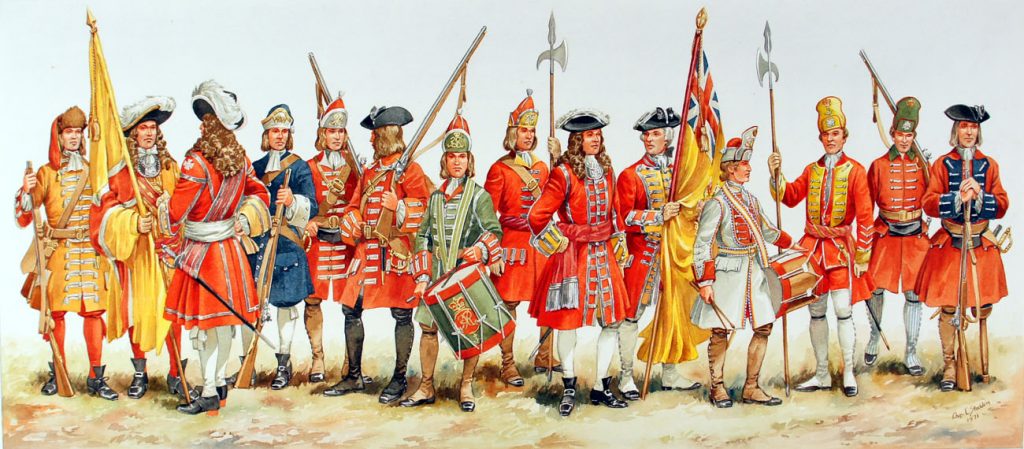
37. Batten down the hatches
Batten down the hatches is clearly a nautical expression meaning that we need to prepare for troubled times ahead. Literally, the old sailing ships had hatches which had open grate like coverings.
When bad weather was imminent, the hatches were covered with canvas. However, this would just blow away if not fixed to the hatch which was done with battens.
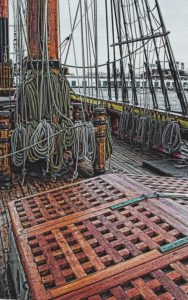
38. Taken aback
When we are surprised enough to take a little jump backwards either literally or figuratively we are “taken aback”. The origin of “taken aback” can be found in sailing. The sails of a vessel are said to be “aback” when the wind pushes them against the masts and spars from which they are suspended. Also, a ship is said to be “taken aback” when is pointed into the wind and being pushed backwards. Both these events would have had to occur unexpectedly hence the connection surprise.
39. Tow rag
Today a tow rag or toerag means a person with no credibility, social standing or respect. The bottom of the barrel if you like. You can understand the negative connotation when we talk about the origin of the idiom.
In the glory days of sail, the British Royal Naval often had the ship’s ablutions at the rear or side of the ship. It basically consisted of a plank in the shape of what we now refer to as a toilet seat. It hangs over the water and the sailor would do his business on it. What was needed was a method of cleaning oneself after the deed was done. The solution was a rope that was frayed at the end. The frayed bit was just submerged and towed behind or next to the ship but in reach of the sailor in question. He would lift the rope (the tow rag) out of the water and rather rudimentary clean himself with the frayed end after which the tow rag was lowered back in the water for itself to be cleaned and therefore ready itself for the next sailor.
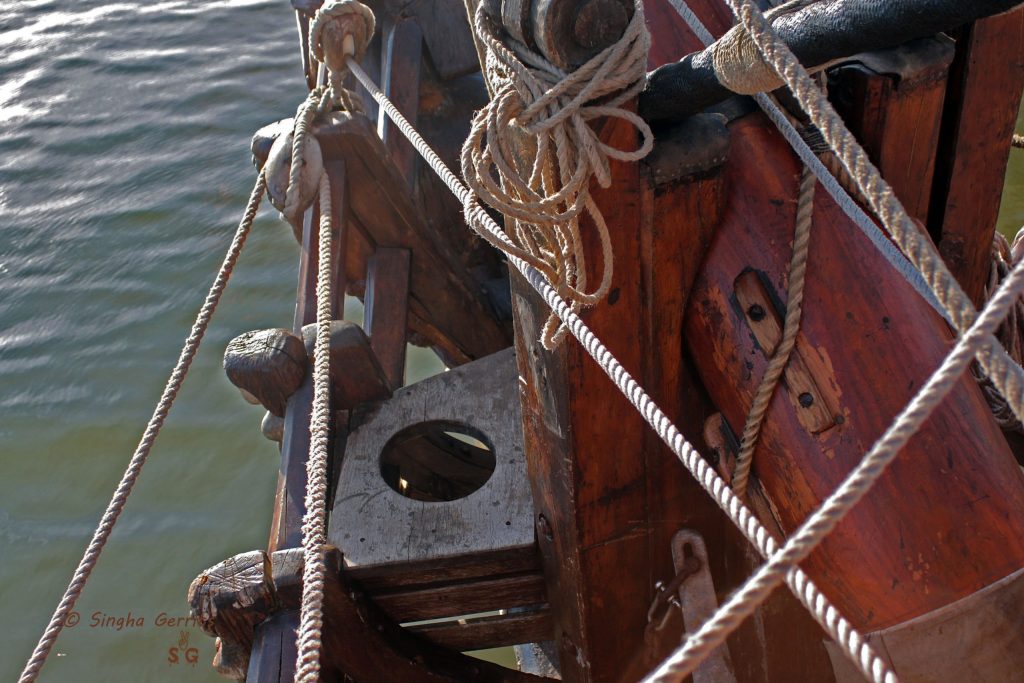
40. To turn a blind eye
To turn a blind eye we refuse to acknowledge something that you know is true. This expression possibly came from Vice-Admiral Horatio Nelson, 1st Viscount Nelson, 1st Duke of Bronté, He was known for his brilliant tactics and strategy but was also blind in one eye. In the first Battle of Copenhagen in 1801. Admiral Sir Hyde Parker ordered a retreat and had the order signalled by flags to Nelson’s ship. However, Nelson ignored the signals. An account from one of his fellow officers states that Nelson put the telescope to his blind eye and reported not to have seen any signals, shortly after which they won the battle.

41. Under the weather
Being under the weather means you are feeling sick. The term is definitely nautical because, since the 1600s, sailors that were feeling sick (I would imagine that the threshold for being sick would be a bit harsher than today’s standards) would be sent below deck to seek some protection from the weather.
42. Full to the gunwales
The expression filled up to the gunwales suggests that there is not a lot of space left: choc-a-block if you like. The word gunwales is pronounced “gunnels” which is also how most people (wrongly) spell the word. “Gunwales” comes from the words “gun” + “walls” and use to describe the top outside of the ship above the gun ports. In modern day sailing we talk about the outermost top edge of a boat hull, usually where the deck and hull come together. On smaller boats we also think of gunwales as the rubber moulded strip that protects the outer edges of our boat.
43. Chock-a-block
Similar to “full to the gunwales”, chock-a-block also denotes that there is no more room left.
The expression came most likely from sailors hoisting something like sails or cargo with a blog and tackle pulley system. When the two opposing blocks came together they were said to be chocked. Ie, the block were choked: chock-a-block…
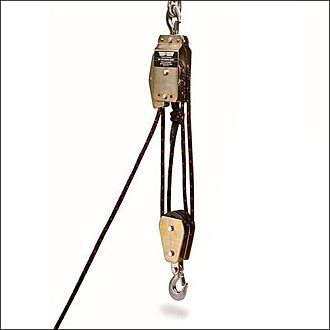
44. Dire straits
Finding yourself in dire straits means you are in danger. The connection to a nautical beginning is relatively uncomplicated or far fetched. Dire is derived from Latin. Latin words often have an array of meanings depending on the context but in essence it means terrible, dreadful, fearful etc…
Couple this with the conditions we can encounter at sea sailing through “troubled waters” and we can quickly see that sailors would refer to channels that are heavily affected by tide, wind, current and swell as dire straits.
45. Take a different tack
Figuratively, if you take a different tack you are trying an alternative approach to solve a problem. In sailing, this is no less true. Tacking is a sailing manoeuvre were a sailboat wants to sail as much into the wind as the boat and physics allow it. The sailboat turns its bow toward the wind so that the direction from which the wind blows changes from one side to the other and does this repeatedly to achieve its desired bearing. For example, sailing up a narrow channel against the prevailing wind. However, the connection to the figurative meaning really is found in racing where a technician on a sailboat reads the weather conditions and potentially spots more favourable conditions on different parts of the course. He or she would advise the skipper who may have to tack to realise the advantage.
46. Shipshape
The word shipshape is obviously of nautical origin. Because of the limited space available on ships, sailors were obligated to maintain their quarters in a neat and orderly fashion so avoid things rolling about on heavy seas. In today’s language, we simply are saying the keep things neat, clean and organised. The sparsely used idiom “shipshape and Bristol fashion” refers to the port of Bristol which was an exemplary port in its days and has a similar meaning.
47. Broad in the beam
Sorry to those who may be offended, but broad in the beam refers to the hips and often highlights hips of a generous diameter.
First used by Captain John Smith, it denotes the widest part of a ship.
There is little imagination required to link the nautical term with the modern-day idiom…
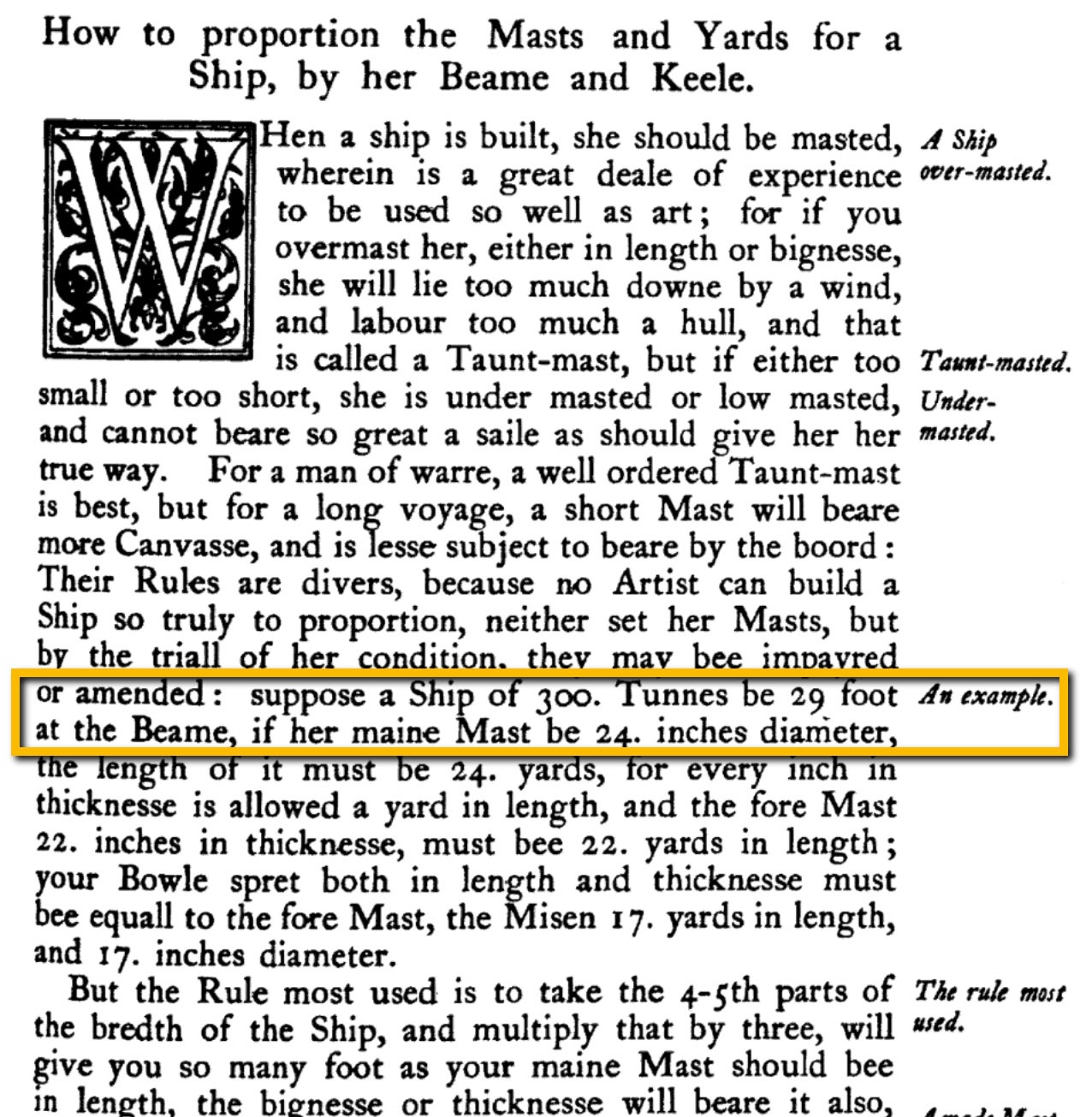
48. Run a tight ship
To run a tight ship means to run a well-controlled operation or a disciplined business. The expression “run a tight ship” dates only from the mid-1900s and denotes a ship that is in good condition and well managed.
49. At the helm
50. Don't rock the boat
Who can forget Hues Corporation – Rock the Boat…
Do you know any other idioms?
If you have any idioms, expressions or sayings that you think have their origin in sailing or maritime in general then let us know by commenting below. Let’s make this the most comprehensive “sailing did you know” list around…
If you feel there are mistakes in the above idioms then don’t hesitate to say…
The English language and phrases are so interesting. Thank you for those little gems
If you come across more then I’m keen to add them…
Taken Aback. ‘ I was so taken aback ‘ From the square riggers when the wind changed direction and blew the sails back onto the mast.
POSH, referring to high class or fancy, is an acronym from the days when Europeans visited the United States. If you were wise, you would take a cabin on the port side of the vessel on the OUTbound leg. and starboard side when going HOME. That way your cabin would have maximum sunshine.Port Outbound Starboard Home.
Thank you for that. I have added your suggestion with a bit of poetic license…
When a vessel has forward movement, it is said to have “way”. Hence underway and give way impede way. — self explanatory really.
Thanks! # 31 done and dusted…
Pingback: Buying your first sailboat - Tall Tell Tales
Pingback: Nautical idioms and sailing terms 201-250 - Tall Tell Tales
Pingback: Nautical idioms and sailing terms 101 -150 - Tall Tell Tales
Pingback: Nautical idioms and sailing terms 51 -100 - Tall Tell Tales
Pingback: Nautical idioms and sailing terms 151 - 200 - Tall Tell Tales
Fathom it out. To work something out. From using a rope with a weight, dropped from the bow, with the rope having knots for each fathom The device could be used to determine the depth in fathoms under the keel, of water when approaching land. The operator counting the knots, and fathoming it out.
Re: “Port Out, Starboard Home”, could it just come from the song in Chitty Chitty Bang Bang?
https://www.youtube.com/watch?v=2BzjPukTLoY
Hi Saul,
That is a good pickup.
I need to do some research and see if this is in fact the origin or if the song’s lyrics were based on something already known.
Much appreciated!
Cheers,
Rene